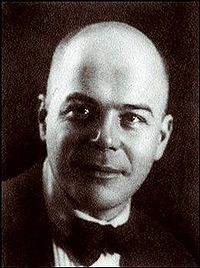- Viktor Shklovsky
-
Viktor Borisovich Shklovsky (or Shklovskii; Russian: Ви́ктор Бори́сович Шкло́вский; Saint Petersburg, 24 January [O.S. 12 January] 1893; Moscow, 6 December 1984) was a Russian and Soviet critic, writer, and pamphleteer.
Contents
Life
Shklovsky was born in St. Petersburg, Russia. His father was Jewish and his mother was of German/Russian origin. He attended St. Petersburg University.
During the First World War, he volunteered for the Russian Army and eventually became a driving trainer in an armoured car unit in St. Petersburg. There in 1916 he founded the OPOYAZ (Obshchestvo izucheniya POeticheskogo YAZyka—Society for the Study of Poetic Language), one of the two groups, with the Moscow Linguistic Circle, which developed the critical theories and techniques of Russian Formalism.
Shklovsky participated in the February Revolution of 1917. Then he was sent by the Russian Provisional Government as an assistant Commissar to Southwestern Front where he was wounded and then got an award for bravery. After that he was an assistant Commissar of the Russian Expeditionary Corps in Persia (see Persian Campaign).
Shklovsky returned to St. Petersburg in early 1918, after the October Revolution. He opposed bolshevism and took part in an anti-bolshevik plot of Socialist-Revolutionary Party members. After the conspiracy was revealed by the Cheka, Shklovsky went into hiding traveling over Russia and the Ukraine but was eventually pardoned in 1919 due to his connections with Maxim Gorky, and decided to abstain from political activity. His two brothers were executed by the Soviet regime (one in 1918, the other in 1937) and his sister died from hunger in St. Petersburg in 1919.[1]
Shklovsky integrated into the Soviet society and even took part in the Russian Civil War serving in the Red Army; but in 1922 he had to go into hiding again and to flee from Russia escaping arrest for his previous activities. In Berlin in 1923 he published his memoirs about 1917-22 called Sentimental'noe puteshestvie, vospominaniia (A Sentimental Journey) after A Sentimental Journey Through France and Italy by Laurence Sterne. In the same year he was allowed to return to the USSR.
The Yugoslav scholar Mihajlo Mihajlov visited Shklovsky in 1963 and wrote: "I was much impressed by Shklovsky's liveliness of spirit, his varied interests and his enormous culture. When we said goodbye to Viktor Borisovich and started for Moscow, I felt that I had met one of the most cultured, most intelligent and best-educated men of our century."[2]
He died in Moscow in 1984.
Work
In addition to literary criticism and biographies about such authors as Laurence Sterne, Maxim Gorky, Leo Tolstoy, and Vladimir Mayakovsky, he wrote a number of semi-autobiographical works disguised as fiction, which also served as experiments in his developing theories of literature.
Shklovsky is perhaps best known for developing the concept of ostranenie or defamiliarization (also translated as "estrangement") in literature.[3] He explained the concept in the important essay "Art as Technique" (also translated as "Art as Device")[4] which comprised the first chapter of his seminal Theory of Prose, first published in 1925. He argued for the need to turn something that has become over-familiar, like a clichè in the literary canon, into something revitalized:[5]
"The purpose of art is to impart the sensation of things as they are perceived and not as they are known. The technique of art is to make objects ‘unfamiliar’, to make forms difficult, to increase the difficulty and length of perception because the process of perception is an aesthetic end in itself and must be prolonged. Art is a way of experiencing the artfulness of an object; the object is not important." (Shklovsky, "Art as Technique", 12)
Shklovsky's work pushes Russian Formalism towards understanding literary activity as integral parts of social practice, an idea that becomes important in the work of Mikhail Bakhtin and Russian and Prague School scholars of semiotics.
Bibliography
In English, by Viktor Shklovsky:
- A Sentimental Journey: Memoirs, 1917-1922 (1923, translated in 1970 by Richard Sheldon)
- Literature and Cinematography (1923?, republished in 2008)
- Zoo, or Letters Not About Love (1923, translated in 1971 by Richard Sheldon) - epistolary novel
- Mayakovsky and his circle (1941, translated in 1972) - about the times of poet Vladimir Mayakovsky
- Third Factory (1926, translated in 1979 by Richard Sheldon)
- Theory of Prose (1925, translated in 1990) - essay collection
- Leo Tolstoy (1963, translated in 1996)
- Knight's Move (1923, translated in 2005) - collection of essays first published in the Soviet theatre journal, The Life of Art
- Energy of Delusion: A Book on Plot (1981, translated in 2007)
- Bowstring: On the Dissimilarity of the Similar (1970, translated in 2011)
References
- ^ Shklovsky, Письма внуку.
- ^ Mihajlo Mihajlov, Moscow Summer (Farrar, Straus and Giroux, 1965), p. 104.
- ^ Carla Benedetti (1999) The empty cage: inquiry into the mysterious disappearance of the author
- ^ Viktor Shklovsky (1917) Art as Technique
- ^ Peter Brooker, Andrzej Gasiorek, Deborah Longworth (2011) The Oxford Handbook of Modernism p.841
See also
- English Translation of "Art as Technique": pages 15-21 Literary Theory: An Anthology. Malden, MA: Blackwell Pub, 2004. ISBN#: 1405106964
External links
- An excerpt from Bowstring in Asymptote
- The Formalist’s Formalist: On Viktor Shklovsky by Joshua Cohen
- An excerpt from the essay "Art as Device" in Context #22
- An excerpt from the essay "Art as Technique" (An alternate translation from "Art as Device")
- Biography in "Энциклопедия Кругосвет" (in Russian)
Categories:- 1893 births
- 1984 deaths
- Russian formalism
- People from Saint Petersburg
- Soviet screenwriters
Wikimedia Foundation. 2010.

